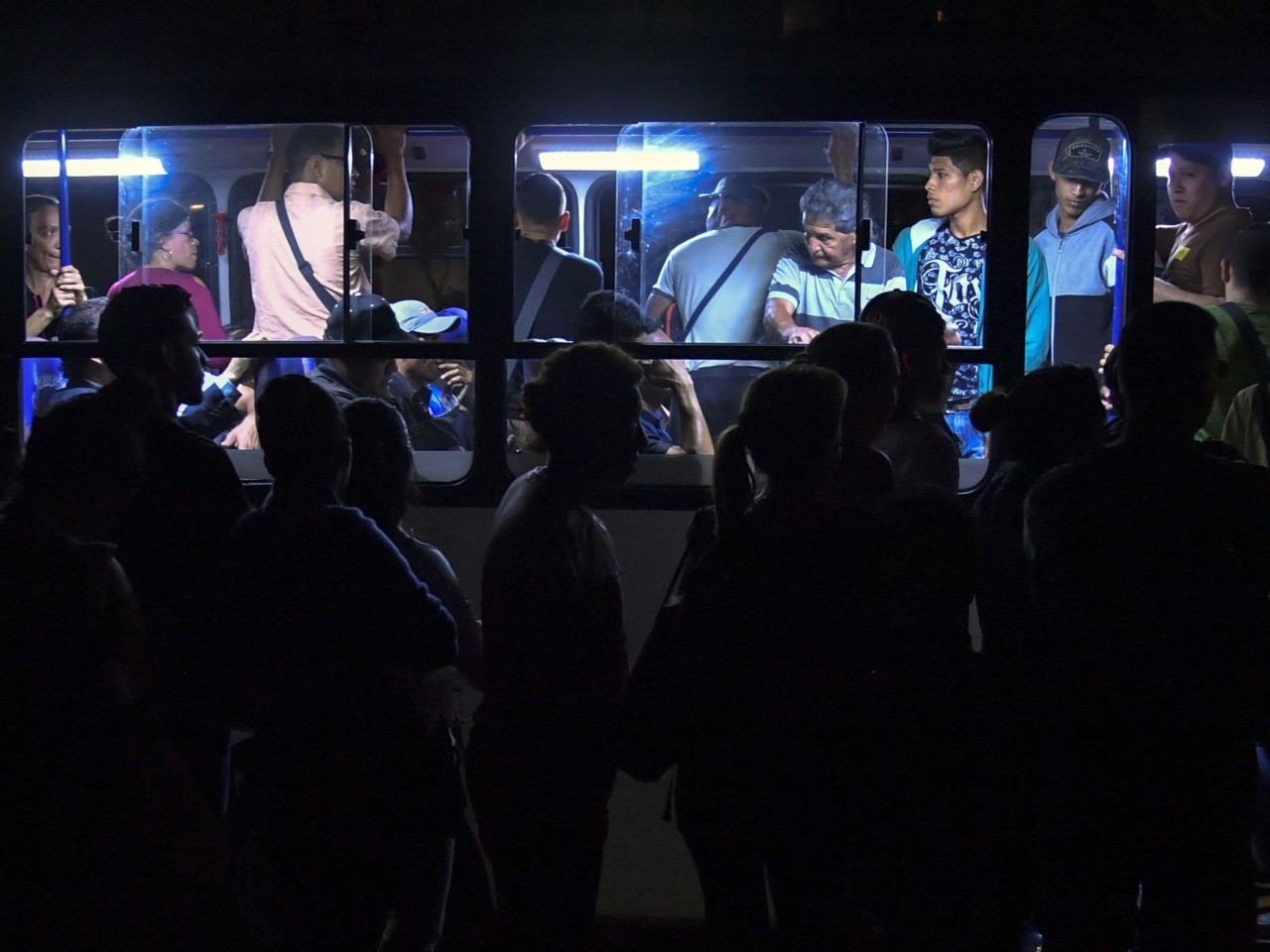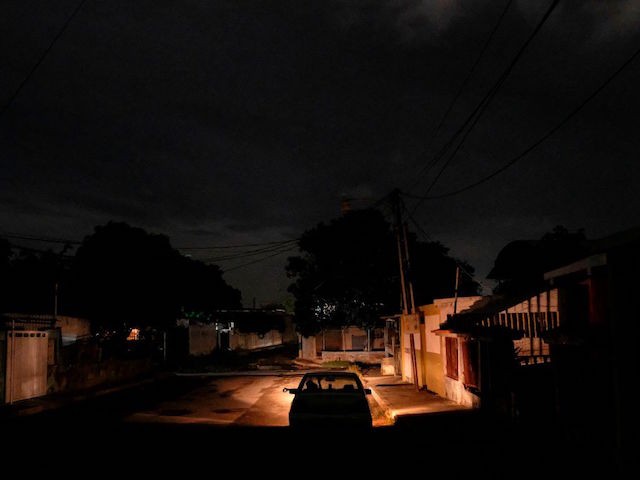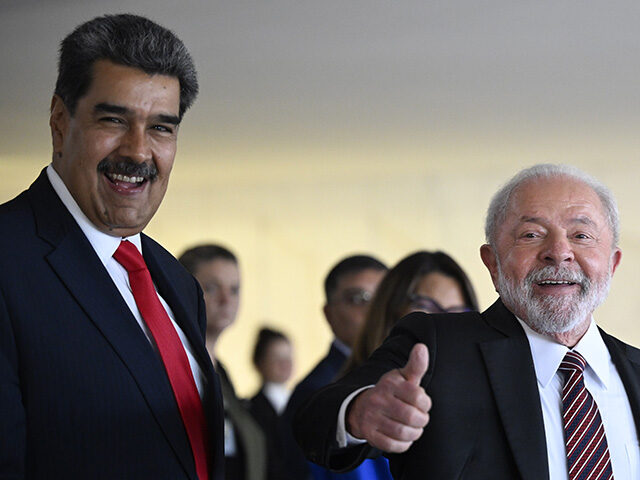Venezuelan socialist dictator Nicolás Maduro offered on Monday to once again provide the Brazilian state of Roraima with electricity — despite most Venezuelans facing lengthy daily blackouts as a result of the nation’s decaying power grid.
Maduro made the offer in a joint press conference between Maduro and Brazilian radical leftist President Luiz Inácio Lula da Silva held after their official meeting in the presidential Planalto Palace in Brasilia. Between 2001 to 2019, Brazil paid the Venezuelan socialist regime to provide power to the the border state of Roraima.
“Venezuela is prepared to rebuild electric cooperation with the state of Roraima, Boa Vista, and the entire border population,” Maduro said on Monday. “We have an offer of 120 megawatts ready, what it merits is a basic investment of about four or five million dollars in function of rebuilding the transmission lines.”
Maduro requested that private enterprises in Brazil aid the collaboration so that the socialist regime could reconnect Roraima to Venezuela’s power grid “very soon.”
#ÚLTIMAHORA Nicolás Maduro ofrece suministrar electricidad a Brasil, en medio de los apagones en Venezuela https://t.co/3L6KIjG1n2 pic.twitter.com/uFNA7lfBlz
— Monitoreamos (@monitoreamos) May 29, 2023
Roraima is a state located in northern Brazil that, due to its geography, is logistically isolated from the rest of the country. As a result, it is the only Brazilian state that is not connected to the country’s national power grid and must rely on diesel-powered plants for its electricity.
Venezuela’s socialist regime had been directly providing Roraima with electricity since 2001 through a connection between Venezuela’s now ailing main power plant, the Simón Bolívar Hydroelectric Plant — more commonly known as the “Guri Dam” — located in Bolívar state.
In 2018, during the administration of Michel Temer, Venezuela’s state-owned Corporelec power company threatened to cut off Roraima’s power citing overdue unpaid bills that amounted to upwards of $30 million. Brazil’s Electronorte power company acknowledged the debt but claimed that it had not failed to pay due to lack of funds but, rather, due to “operative difficulties” preventing the transfer of the monthly $4 million bill owed to the socialist regime.
In 2019, under the administration of Jair Bolsonaro, Roraima stopped receiving power from Venezuela after Brazil cut diplomatic relations with Maduro. In that same year, Bolsonaro’s administration announced talks to resume plans to connect Roraima to Brazil’s power grid, thus eliminating the need to purchase Venezuelan-generated electricity for the northern state.

People line up to board a bus during a new power outage in Caracas, on March 30, 2019. (YURI CORTEZ/AFP via Getty Images)
The plan, originally launched in 2011, faced continued opposition from local indigenous communities, who refuse to allow the construction of the required power lines through their territory.
Lula da Silva welcomed Maduro’s offer on Monday, expressing that his government wants to restore its energy relationship with Venezuela.
“That line of Guri has to be put into operation because there is no justification for Roraima to be the only state outside the Brazilian energy matrix, working on the basis of thermoelectric power, much more expensive, very polluting,” Lula said during the joint press conference.

A car is seen on a street during a power cut in Maracaibo, Venezuela on August 15, 2019. (MATIAS DELACROIX/AFP via Getty Images)
“Our energy minister will talk to the energy minister of Venezuela and I hope that as soon as possible they will convince us to participate in the re-inauguration of the Guri line for the good of the Brazilian people,” he continued.
Maduro’s offer to resume providing power to Roraima comes at a time when Venezuela’s power grid lies in shambles after more than two decades of socialist mismanagement, which have left the majority of the country’s citizens facing daily blackouts that average around six hours. Some of the most affected Venezuelan states, such as Zulia and Táchira, have faced blackouts since 2009. The socialist government has taken no meaningful action to resolve the issue in over a decade.
Venezuela’s power grid completely collapsed in March 2019 after a massive failure at the Guri power plant. The near weeklong blackout effectively shut down the country. A second series of blackouts took place later that month.
The Maduro regime blamed the collapse of the power grid on a “cyber attack” allegedly orchestrated by the United States and directed by U.S. Senator Marco Rubio (R-FL).
While the blackouts slowly improved — but were never outright solved in some areas of the country — in recent years, the situation has once again worsened in 13 out of Venezuela’s 23 states as of March. Venezuela’s power grid is no longer capable of generating enough power to consistently provide electricity to the entire country without rolling blackouts. This month, Corporelec asked private companies to generate their own electricity to help offset the power deficits in Zulia state.
The city of Caracas, as both the capital of Venezuela and the seat of power of the socialist regime, has been historically spared from the blunt effects of Venezuela’s crumbling power grid. Despite that, sporadic electrical failures in Caracas have taken place throughout 2023.
Christian K. Caruzo is a Venezuelan writer and documents life under socialism. You can follow him on Twitter here.

COMMENTS
Please let us know if you're having issues with commenting.